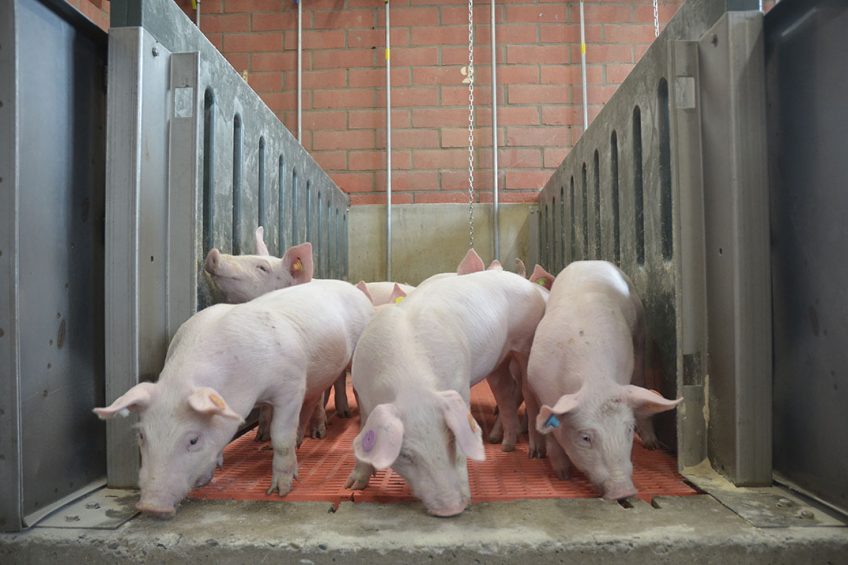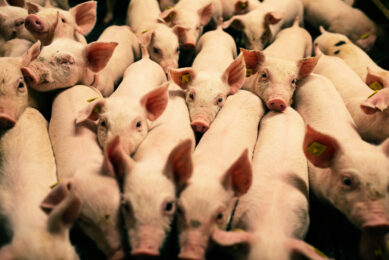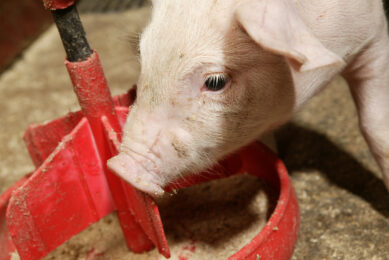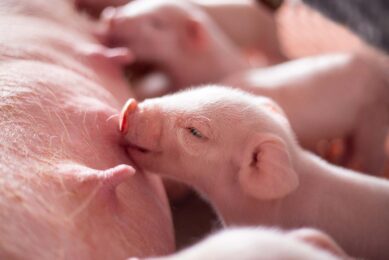Fasting to achieve a higher feed intake

Counterintuitive as it may sound, but sometimes less might be more. In recent Belgian research, scientists observed a better feed intake in piglets that were given their first meal only 18 hours post-weaning.
It is generally accepted that early post-weaning feed intake affects post-weaning health and performance. However, there is large variation in the onset of feed intake after weaning and the amount that piglets eat during the first days after weaning. In a Dutch study by Erik Bruininx and others in 2002, a small percentage of pigs took longer than 24 hours before eating their first meal. The post-weaning growth check, due to low feed intake affects farm productivity. Especially piglets that have not consumed creep feed before weaning have to learn to recognise and consume solid feed.
Moreover, piglets express neophobia when faced with unfamiliar feed. In general, weaning remains a stressful event with an important impact on the animals. The associated stress level may affect their learning capabilities, which could in turn reduce consecutive feed intake. The question therefore arises whether the first day after weaning is the best day to discover their new type of feed. That is why the following experiment was designed to study the effect of 18-hour delay in solid feed provisioning on the feed intake and performance of piglets during the first weeks after weaning.
Trial set-up
For the experiment, conducted at Flanders Research Institute for Agriculture, Fisheries and Food (ILVO) in June 2018, a total of 144 weanling pigs were used. The average body weight at weaning was about 8.1kg. The pigs were divided among 24 pens, blocked per gender (castrated male or female) and body weight group. The division of littermates over different pens resulted in them being mixed with unfamiliar animals. Before weaning, piglets received a commercial creep feed, hence creep feed composition differed from the post-weaning diet. After weaning, all pigs received the same post-weaning diet during the entire experiment, cold pelleted with pellet size of 6 mm. Feed and water were provided ad lib.
Treatments
The research team compared the effects of 2 treatments:
- Control treatment: Feed was present in the feeders when the piglets were moved to their compartment.
- Delayed provisioning of solid feed: Feed was provided only from the next morning, at 8am onwards. That resulted in an 18-hour delay in solid feed provisioning.
All pigs were weighed individually at weaning (4 weeks of age), 5, 7 and 9 weeks of age. At the end of each period, feed leftovers were recorded to calculate feed consumption per pen and per period. Average daily gain (ADG) and average daily feed intake (ADFI) in a period were calculated per pen. Feed efficiency was calculated as the ADFI divided by the ADG of the pen. These performance parameters were calculated for the first week after weaning, the first 3 weeks after weaning and the total period (4 to 9 weeks of age). For both treatments, the number of days was considered the same.

Results and discussion
No post-weaning diarrhoea was observed in any of the pens. In the first week after weaning, statistical analysis did not reveal differences in feed intake, gain or feed efficiency between the treatment groups. Still, the treatment had an effect on the feed intake: over the duration of the experiment, piglets in the ‘delayed’ group had a higher feed intake than control piglets (594 vs. 569 g/day). As a result, ‘delayed’ piglets showed increased bodyweight three weeks after weaning (16.1 vs. 15.6 kg). That effect on bodyweight was not significant over the whole course of the experiment, however. Feed efficiency was not significantly affected.
The results are counterintuitive, as it is generally accepted that it is important that piglets start eating as soon as possible after weaning. Fasting affects intestinal morphology. It is possible, that the amount of feed ingested during the first days after weaning may be more important than the onset of feeding. The reduced feed intake post-weaning has immediate and mid-term effects on piglets’ growth and metabolism. Also, individual creep feed intake was not monitored.
Still, the results are thought-provoking and further mechanistic research may help to optimise feeding management of newly weaned piglets.
Theories to explain the lower feed intake
The researchers raise different theories for explaining the lower feed intake in control piglets.
- Firstly, weaning is a stressful period for piglets. As a consequence, it might be that piglets associate this stress with the sensation caused by ingesting feed, negatively affecting their affinity for solid feed.
- Secondly, the stress around weaning may affect the piglet’s learning abilities. Especially piglets that have not been consuming creep feed need to learn recognising solid feed. Thus, when providing feed for the first time on the day after weaning, due to their level of hunger and probably lower acute stress levels, the ability to learn to eat solid feed from pen mates might have increased.
- Thirdly, it is possible that most pigs lack the motivation to eat very much on the day of weaning, whether or not the feed is present. The ‘delayed’ pigs received fresh feed the day after weaning. It is possible that the act of presenting fresh feed at that time may have stimulated them to eat more. In the pigs in the control group, feed was already present and therefore, the pigs did not receive a stimulus similar to receiving fresh feed on the day after weaning.
- Finally, the uptake of nutrients during a stressful period may by itself have some detrimental effects.
The present trial showed that an 18-hour delay in the first feed provisioning had a sustained effect several weeks later. It shows that appropriate feeding of newly-weaned piglets involves more than simply providing the right set of nutrients; feeding management must also be taken into account.
It can be concluded that small changes in feeding management after weaning may have prolonged effects on piglets. However, the researchers warn against overly quick conclusions concerning this trial. This warrants the need for further research.
* This article is an approved and condensed version of a publication in Livestock Science. That article was authored by Sam Millet, Hubèrt van Hees, Geert Janssens and Sarah De Smet.






